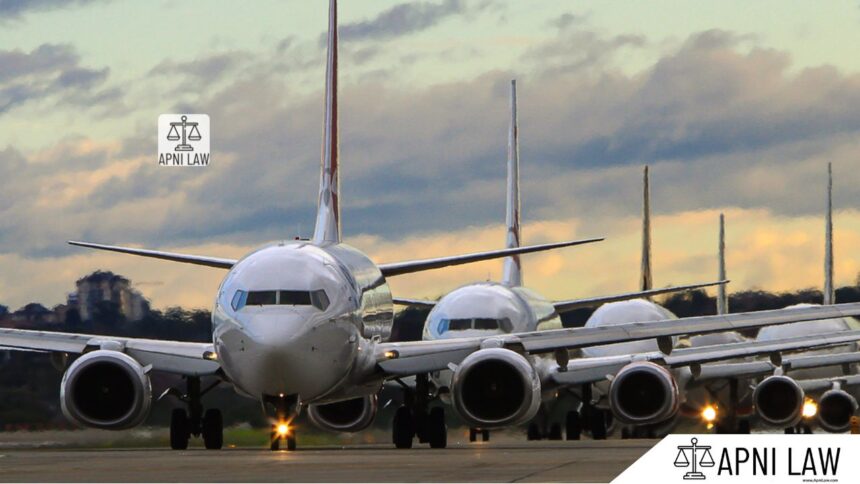This article is written by Amna Kabeer, student at the University of Calicut with a strong interest in the aviation sector. Passionate about simplifying complex legal developments, she aspires to build a career in aviation industry. For any feedback or queries, feel free to reach out to us through our official channel.
Introduction
The Bharatiya Vayuyan Adhiniyam, 2024 marks a historic transformation in India’s aviation sector. Replacing the outdated Aircraft Act, 1934, this law introduces a modern, streamlined regulatory framework designed for 21st-century aviation challenges. It brings India in line with global standards set by the International Civil Aviation Organization (ICAO) and the Chicago Convention, enhancing India’s credibility in the international aviation community. With the exponential growth of domestic and international air travel in India, outdated laws were no longer sufficient. The new legislation empowers key aviation regulators, simplifies licensing processes, strengthens passenger rights, and encourages innovation in aircraft manufacturing. Most importantly, it prioritizes passenger safety and operational efficiency through stricter oversight and clearer accountability.
Modern Aviation Law with Global Alignment
The Bharatiya Vayuyan Adhiniyam, 2024, marks a significant shift in India’s aviation framework by repealing the colonial-era Aircraft Act, 1934, under Section 3. This change brings Indian aviation laws in alignment with international standards set by the International Civil Aviation Organization (ICAO). The Act enhances India’s global credibility, ensures smoother international cooperation, and supports uniform safety and operational norms across borders.
Stronger Safety and Security Oversight
Sections 4 to 9 of the Act grant statutory authority to the Directorate General of Civil Aviation (DGCA), the Bureau of Civil Aviation Security (BCAS), and the Aircraft Accident Investigation Bureau (AAIB). These regulators now have stronger enforcement powers to oversee licensing, safety compliance, and accident investigations. Chapter IX introduces stringent penalties, including fines up to ₹1 crore and imprisonment for violations such as unsafe flying and operational negligence, ensuring a more secure aviation environment.
Simplified Licensing and Certification
Under Section 11, the responsibility for issuing the Radio Telephone Restricted (Aeronautical) [RTR(A)] certification has been shifted from the Department of Telecommunications to the DGCA. This change eliminates bureaucratic delays in pilot licensing and certification. By centralizing licensing under one authority, the Act enhances the ease of doing business for airlines and promotes faster, more efficient regulatory clearances.
Boost to Indigenous Aircraft Manufacturing
Section 13 empowers the DGCA to regulate the design, testing, and manufacturing of aircraft. This is a major step in promoting domestic aircraft production under the government’s Make in India and Atmanirbhar Bharat initiatives. By enabling a clear regulatory pathway, the Act supports innovation, encourages investment in the aviation manufacturing sector, and reduces dependence on foreign imports.
Improved Passenger Rights and Transparency
Chapter X of the Bharatiya Vayuyan Adhiniyam, 2024, establishes a clear framework for passenger rights and the responsibilities of airline operators. It includes provisions for compensation, refunds, and transparent communication during delays or disruptions. The Act introduces structured grievance redressal systems, allowing passengers to escalate complaints and seek timely resolutions, thereby improving consumer confidence in air travel.
Efficient Dispute and Appeals Process
To streamline legal procedures, Chapter XI introduces a designated appellate authority for aviation-related disputes. This reduces the burden on traditional courts and facilitates faster, expert-led resolution of complaints and regulatory issues. The new appeals process ensures that airlines and passengers have timely access to justice, improving accountability within the sector.
How BVA 2024 Enhances Airline Safety Standards
Section 4 of the Act gives the DGCA clear legislative authority, transforming its safety guidelines into enforceable mandates. Airlines are now legally required to comply with rigorous safety and maintenance standards, creating a more accountable and secure aviation sector.
Severe Penalties for Non-Compliance
Sections 52 and 53 of the Act introduce strict penalties for offenses like unauthorized operations, unsafe flying, and violating airport security rules. Penalties include imprisonment of up to two years or fines up to ₹1 crore. These provisions act as strong deterrents, compelling airlines and operators to prioritize compliance and safety.
Alignment with Global Best Practices
The Act aligns India’s aviation standards with global norms under the Chicago Convention and ICAO audit mechanisms. It introduces practices such as Safety Management Systems (SMS) and Performance-Based Navigation (PBN), bringing Indian aviation in line with international safety procedures and enhancing overall airspace management.
Enhanced Training and Skill Development
Under Section 6, the DGCA now regulates training standards for flight crews and ground staff. The Act mandates recurrent training programs, which help reduce human error and improve safety outcomes. Regular skill upgrades are now an industry standard, improving operational readiness and professionalism.
Technology-Driven Monitoring and Safety
The Act promotes the adoption of real-time aircraft monitoring systems and predictive maintenance technologies. These tools reduce the likelihood of mid-air technical issues and mechanical failures, enhancing passenger safety and enabling proactive maintenance strategies for airlines.
Impact on Airlines and Passengers
For Airlines
The Bharatiya Vayuyan Adhiniyam, 2024, provides a simplified compliance framework, reducing red tape and speeding up licensing and expansion approvals. It encourages domestic aircraft production, the use of advanced aviation technologies, and smoother international collaboration, allowing airlines to innovate and grow faster.
Passengers benefit from safer and more reliable air travel. The Act introduces clear rules on cancellations, refunds, and complaint redressal, ensuring better accountability from airline operators. It also improves the overall travel experience by setting standards for both in-flight and on-ground services.
Conclusion
The Bharatiya Vayuyan Adhiniyam, 2024 is a major leap for India’s aviation sector. By aligning with international norms, strengthening safety standards, and simplifying regulations, it benefits both airlines and passengers. It paves the way for a safer, faster, and more efficient aviation future in India.








